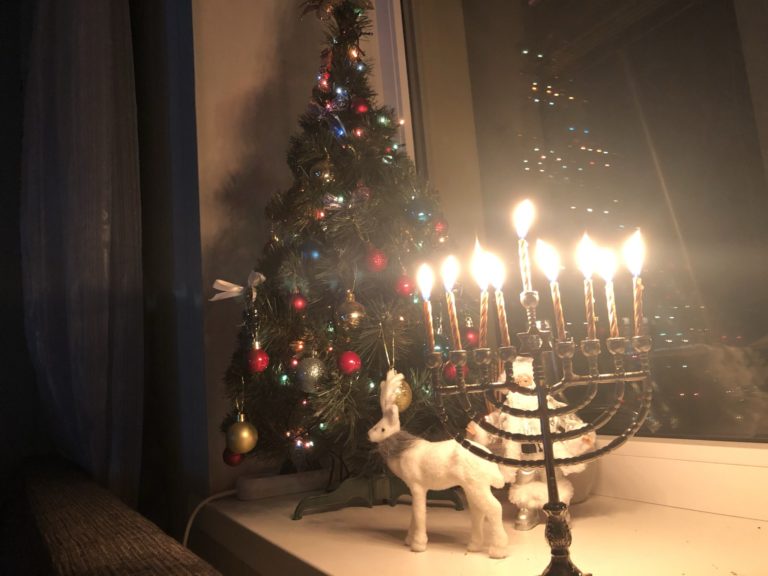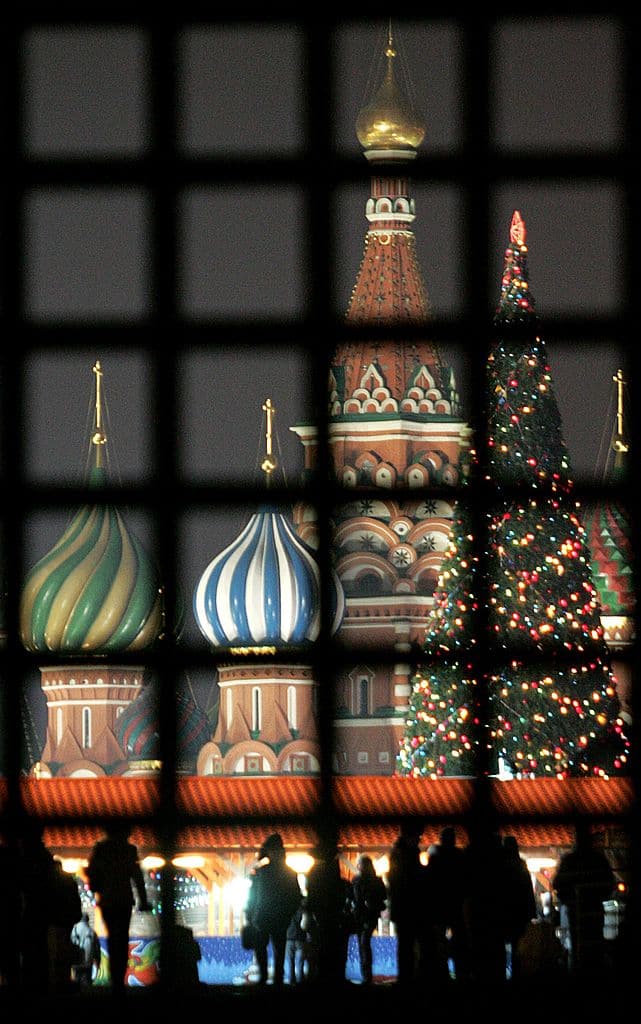
Jews don’t celebrate Christmas. And Hanukkah is not a Jewish version of Christmas either.
So why do some Jews put up decorated fir trees (yup, the ones generally associated with Christmas) around December?
No, it’s not a ‘Hanukkah bush’ or a way to feel more included around Christmas-time.
Russian Jews put up a fir tree in honor of Novy God, the Russian New Year, which is a secular Russian tradition (kind of like the way American Jews celebrate Thanksgiving).
Let’s unpack its origins, the misconceptions around the celebration, and how it’s marked today.
Where did Novy God come from?
The history of the Christmas tree in Russia happens to be quite extensive. (It is explained in detail, as researched by literary scholar Elena Dushechkina here.)
In summary, although fir trees were associated with Christmas in Russia before the 1900s, under Stalinist leadership the Kremlin abolished church holidays, including Christmas. That meant the Christmas tree was completely banned (although some people put them up in secret.)

All religious holidays were prohibited, but Novy God became a compromise of sorts. In the mid 1930’s, Stalin allowed for the festive fir tree to be known as the “Soviet fir” and it became associated with celebrating the new year.
That meant everyone, including Jews, could subscribe to the tradition – and the secular civic holiday stuck.
From there, Novy God traditions emerged: decorating a Yolka tree, spending the day feasting with family and welcoming Ded Moroz (Grandfather Frost), who is often depicted as a blue-coated Santa Claus that brings presents for children under the tree with the help of his granddaughter Snegurochka (the Snow Maiden).
How is it different from Christmas?
At first glance, Novy God seems eerily familiar to Christmas, but it is a completely secular holiday, Russian-speaking Jews have insisted.
Although the Russian ‘Santa Claus’ and Yolka tree bear resemblance to Christmas celebrations, Novy God features no religious symbolism or practices.
The date itself is also different. Christmas is celebrated on December 25th in Western society and on January 7th in Russia and Eastern Europe (in accordance with the Eastern Orthodox calendar).
Novy God makes more decoration options available. pic.twitter.com/CgpDnW2tSD
— Curious George Soros ❤️✊✌️ (@Bartaway) December 18, 2020
Why is it controversial?
The great wave of immigration to Israel from the former Soviet Union began in 1989 and brought nearly a million Russian speakers to Israel by the end of the 1990s.
Hundreds of thousands of newcomers qualified for Israeli citizenship through family connections, but were not considered ‘legally Jewish’ under the interpretation of Jewish law, which maintains that a person is considered Jewish if their mother is Jewish.
This reality has caused some tensions towards Russians within Israeli society and has led many immigrants to say they feel that they are viewed suspiciously by others and have to constantly prove their Jewishness, writes Isabel Kershner in a New York Times article on Novy God.
The suspect Jewish connections for some Russian immigrants, combined with a holiday that seems very similar to Christmas, has made celebrating Novy God in Israel a topic of discussion.
Some Israelis openly oppose marking December 31st in any particular way, feeling that it is an unwanted foreign influence over the Jewish identity of the state.
But those who celebrate Novy God say the greatest misconception of the holiday is a particularly damaging misnomer: Novy God has been confused with the feast day of Saint Sylvester, a Christian day in honor of the fourth century Bishop of Rome, Pope Sylvester I, who served as pope of the Catholic church from 314 to 335 and died on December 31st.
Those who conflate Novy God with Sylvester might be especially troubled because Pope Sylvester I was allegedly an antisemite. There is little written about Sylvester but some say he is the one who convinced Constantine to promote antisemitic legislation and prohibit Jews from living in Jerusalem.
“I remember that when I was a teenager, people accused us of celebrating Sylvester, but we didn’t even know what they were talking about,” Irenne Zbarsky, who immigrated to Israel with her family when she was five years old, said.
“Who is Sylvester, what do they want? It had nothing to do with our holiday and we didn’t understand the criticism. No one in Russia has ever said the word Sylvester – and either way, as a Christian priest, he was obviously banned, like any other Christian symbol, so we were really confused.”
Novy God has been especially rejected in some political circles. In 2004, a bill was presented to the Knesset by a member from the National Religious Party calling on the government to ban all Christmas (or related) iconography in schools, including Novy God trees and symbols. The bill was ultimately rejected by the Knesset Education Committee.
Still some families abandoned the tradition altogether, reported Haaretz, due to the controversy.
“We were ashamed,” said Alex Rif, a Tel Avivian, who immigrated to Israel from Ukraine in the early 1990s.
Rif is part of a small group of Russian-Israeli activists who launched an “Israeli Novy God” campaign on social media in 2015.
“Our goal is to erase all the stigmas around Novy God,” said Rif in an interview. The campaign shares funny videos showing what Novy God ‘really’ looks like and matches Russian-speakers with native-born Israelis who want to experience Novy God.
“It’s not a Christian holiday, and it’s not a time when we go out to bars to get drunk. Rather, it’s an opportunity to get together with the family in the intimate environment of our homes to share food, stories, and gifts.”
How is Novy God celebrated today?
The founders of “Israeli Novy God” explained what a typical holiday celebration might look like.
First: a huge feast.
A typical Novy God celebration begins with “zakuska,” a sweeping spread of appetizers.
“In the Soviet Union, Those who could afford it served exclusive delicacies, including caviar, salmon, seafood, high-quality Eastern European sausages and hot dogs and various delicacies,” the Israeli Novy God website explains.
The meal concludes in the famous Napoleon cake (also known as mille-feuille).
If invited to a Novy God celebration, it’s customary to bring a bottle of alcohol, food, chocolates or surprises, the site notes.
A collection of traditional recipes submitted by members of their community can also be found on Israeli Novy God’s website.
Given the celebratory tone of the day, it’s also customary to wear your best clothes. In the Soviet Union, some children would dress up in costumes, but because of Purim, most Russian Israelis no longer practice that tradition.
Another highly important tradition is the toasts, which usually begin at 11 p.m. Israel time (the hour when midnight strikes in Moscow).
“The tradition of saying a speech while sipping alcohol, is a well-developed and beloved art among people from the Soviet Union,” the site explains
Next, it’s time for Grandpa Frost to make his appearance and hand out gifts to the children. At midnight Israel time, family and friends toast the New year once again and spend the rest of the night telling stories and watching Russian films.
In Israel, Novy God has also taken on a different meaning for some Russian-speaking Jews.
“It’s become an opportunity for many of us to talk to our parents and grandparents about Jewish life in the old country and learn about our heritage,” Rif said.
Originally Published Dec 29, 2021 12:02AM EST


